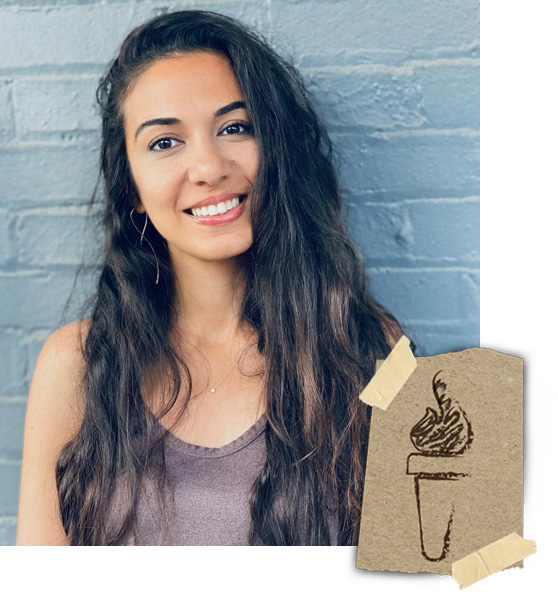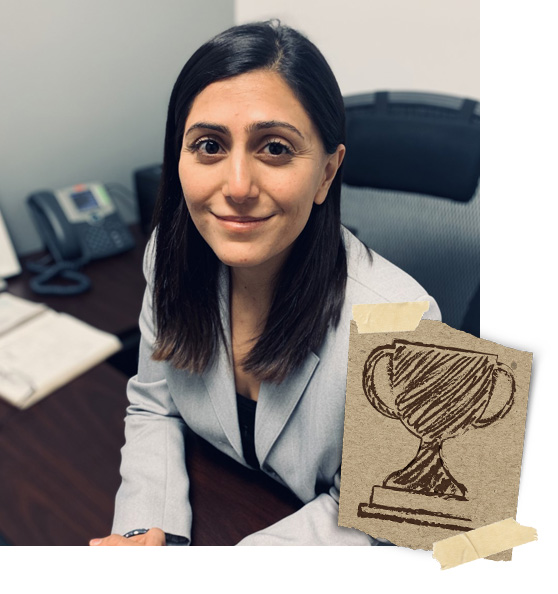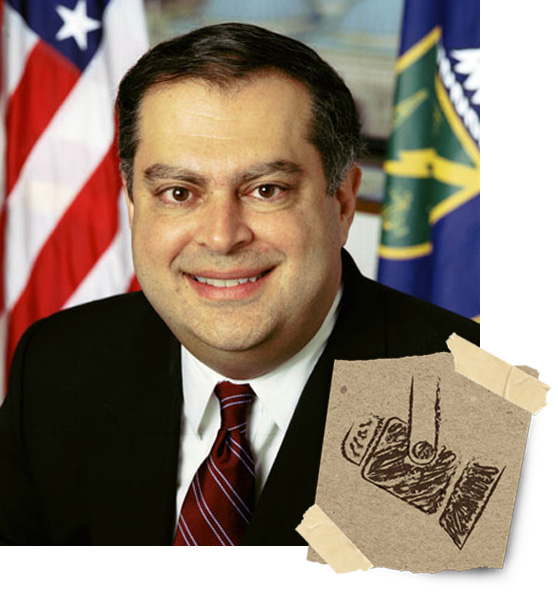Diversity Torch: Marwa Bakabas
April 11, 2021 - Liz Schondelmayer

Marwa Bakabas is a PhD student in the Department of Anthropology. Working with faculty advisor Dr. Mara Leichtman, whose research focuses on humanitarian work in the Middle East and Africa, Marwa is a sociocultural anthropologist studying the displacement of Yemeni refugees.
For Marwa, the decision to start a PhD was a difficult one - but the community she found at MSU helped her pursue her passion project.
I was writing my Master's thesis in Lebanon, and I found it to be a therapeutic outlet for me. It was the first time I was able to express how I was feeling in what I witnessed and the stories of others in writing. While I was writing this ethnographic piece, I decided I wanted to apply for a PhD, but by then, it was very late in the game, so I had to rush the process a bit and reach out to a lot of different universities. I wanted to refocus from studying refugees in Lebanon and Greece and instead focus on the Yemeni refugee community, and that's when I decided to apply for a PhD program.
I decided to apply at MSU because they had more opportunities for me to become an academic practitioner and continue my work as an activist. I approached MSU, and they were really receptive. It was a very hard decision to start a PhD program and move back to the U.S. - especially to such a cold state! - but I've had a great experience with my department so far. The faculty has been incredibly supportive of my work, and my cohort and I have always been there for each other, so all of that has definitely made this program easier!
Marwa's research centers on anthropology in the Middle East, humanitarianism and identity politics. Her thesis will center on the war and conflict in Yemen and the subsequent displacement/exile of Yemeni refugees.
Identity politics is definitely a social and political struggle that comes with several complex layers. Identity politics has shaped me living as an Arab-American in the United States and with an immigrant family and diaspora. The in-betweenness is a real struggle and sometimes hard to balance, but it has given me the agency that I need to learn more about myself and to be proud of my multifaceted identitty.
I think the racism and the struggles with identity can vary from diasporic communities, like myself, and in different ways among other populations, such as refugees. Refugees face another type of identity politics which limits their rights because of their citizenship and status as refugees or "irregular" migrants. The media and public image has defined them in a way that has excluded their identities as it has with other marginalized groups. These struggles with identity have been shaped by how larger institutions have categorized us humans based on ethnicity or where we come from. They have very much been stereotyped to fit in a certain category that is rooted in xenophobic beliefs.
In both her personal and professional life, Marwa is inspired by the Arab Americans making a difference in their communities.
As Arab-Americans, we have a choice in how we embrace or neglect our identity and so many of my counterparts and friends that I have crossed paths with have inspired me especially those who continue to preserve our traditions while helping spread awareness and knowledge to break stereotypes. A few of the Arab-Americans that inspire me that I would like to mention are some of my former colleagues who continue to fight for Arab-American Civil Rights (including Marielle Costanza, Laila Mokhiber, Nicole Saleem, Raed Jarrar, and the late Renée Moorad).
Given the rise in bigotry aimed at the Arab American community over the last few years, Marwa shares how all of us can be better allies in our day-to-day endeavors.
I think we can all be better allies by standing in solidarity with one another. Many groups face marginalization and racism in America and all over the world. We need to stand together and build stronger allyship instead of amplifying our differences. We need to promote our culture and educate. This involves utilizing our education system and educating students on these existing issues, raising awareness, and understanding different cultures and faiths so that there are less stereotyping and lumping categories into "the other." Being an Arab-American has meant being "guilty by association," just for living as an Arab.
Lastly, Marwa shares and dispels some of the misconceptions and stereotypes that her and other Arab Americans face in their daily lives.
Not all Muslims are Arab and not all Arabs are Muslim. All Arab women are not oppressed or live in a misogynistic world as stereotyped.
I think we need to push beyond the boundaries of being stereotyped for having oil, knowing how to belly dance, being terrorists, wearing headscarves or having long beards. We aren't Jasmine and Aladdin or terrorists. Just like any other racial or ethnic identity, Arabs are human and individualistic. We all make our own decisions and choose to live the way we want, and that might or might not include practicing our faiths.
Learn more about Marwa and her research here.
Read more:

Diversity Champion
Faculty/Staff
Dr. Nazita Lajevardi
Dr. Nazita Lajevardi, assistant professor in MSU's Political Science department is an attorney and scholar who studies political opinion and political behavior in Muslim and Arab American communities.

Diversity Spotlight
Alumni
Secretary Spencer Abraham
Secretary Spencer Abraham, a MSU Alumnus, has worked to make our world a better place for all. He has served as an attorney, author, U.S. Senator and U.S. Secretary of Energy. We celebrate his selfless and unwavering service to our nation.

Diversity Matters
We strive to cultivate an inclusive and welcoming college environment that celebrates a diversity of people, ideas, and perspectives.

